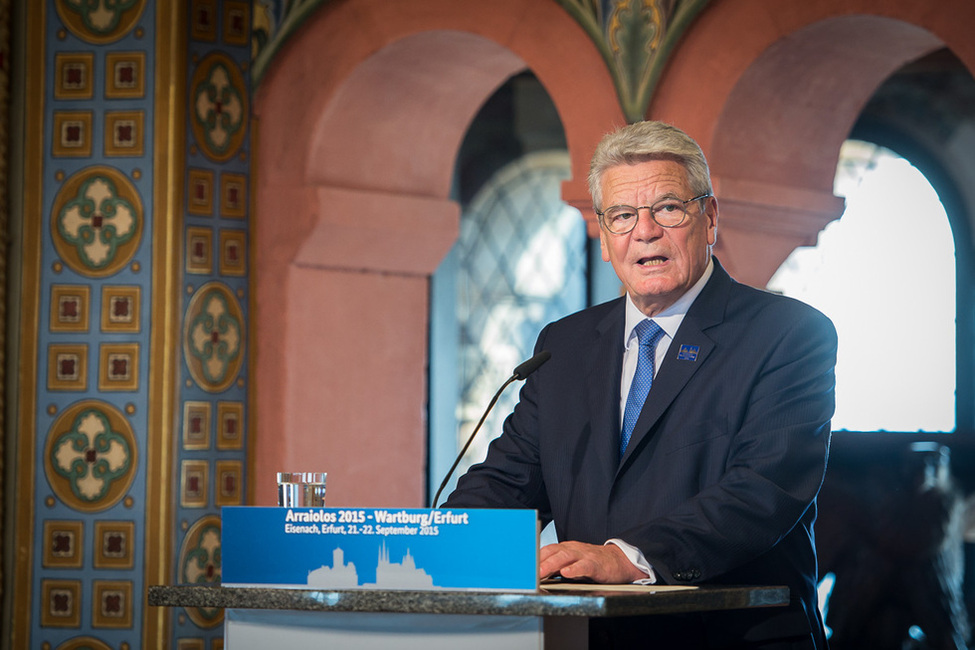Translation of advance text.
I am delighted to be able to welcome you to the Wartburg today. Our meeting is therefore taking place literally at the heart of Germany – we are almost precisely at this country’s geographic centre.
But the Wartburg is also one of Germany’s most important spiritual locations. It was here that cultural developments and historical currents met, and where the spirit of the age was especially apparent at particular moments in history. As a German site of memory, this castle is also significant for European culture and European history.
The Wartburg’s chequered history is the story of what constitutes European identity.
There’s Elizabeth of Thuringia, for instance, who came from Hungary and who – as the Umbrian Saint Francis of Assisi had done before her – used her wealth to help the hungry and poor. Christian love is one of the roots of a social Europe founded on the principle of solidarity. In the absence of its commitment to the weakest of the weak, Europe would forfeit its soul.
And then there’s Martin Luther, who translated the New Testament up here. In two years’ time, we will be marking the five hundredth anniversary of the start of the Reformation. We will call to mind the countless profound spiritual debates and discussions that took place in Europe in the struggle for truth. While Martin Luther’s teachings had such an uplifting and liberating effect on many people, we also recall how much hate and destruction there was, how much blood was spilled in the course of Europe’s religious wars, and the long path to tolerance and peaceful coexistence. I am delighted that Professor Kaufmann is with us to explain the political dimension of the Reformation in its European context in just a moment.
In 1817, three hundred years after the Reformation, German students marked this event here at the Wartburg and called for national unity and freedom for all Germans at what came to be known as the first Wartburg Festival. So the Wartburg also stands for a longing for peace and political self-determination – and therefore preserves the precious European memory that freedom can never be taken for granted. That you have to fight for it – to enforce as well as preserve it.
When meeting up here at the Wartburg and later on in Erfurt, a city which is culturally and historically just as significant, we are therefore most clearly reminded of the kind of Europe that we want to work to achieve.
We stand for a Europe that, especially in the face of crises and challenges, can be sure of its great strengths and which must act with its great achievements in mind. A Europe committed to the weakest and the persecuted, a Europe of peaceful cooperation between religions and cultures, a Europe of freedom and democracy and a Europe that, ultimately, time and again brings to mind the beauty of the world and the greatness of humanity.
We can only preserve this Europe if we work on it together. It is important for us to stick together especially in our approach to the many refugees coming to our continent. We must stand shoulder to shoulder to tackle the inescapable tasks that we face. This is our shared responsibility.
We non executive heads of states also want to do our part. For more than a decade, we have engaged in dialogue in an informal atmosphere, focusing on the issues facing our nations and the European community of states and which are of great significance for us all. At this meeting, we want to ask ourselves the following questions in particular: How should we educate our young people? How can we bring about ownership through education? And how is cohesion in Europe faring? How can we make Europe more cohesive?
Let us therefore stick together and go forward together. First of all, in our programme...
... that now turns to the Reformation and its significance for Europe. This is a topic that, while switching our focus to the past, is relevant to our own age. Not only in terms of its consequences and repercussions, but also as a reminder to us that identities – also the European identity – are not fixed entities, but are always subject to processes of development and change.
I am delighted that Professor Thomas Kaufmann will introduce us to the topic with his lecture.
Professor Kaufmann has been chair of Church History at the Georg-August-Universität in Göttingen since 2000 and is, among other things, President of the Verein für Reformationsgeschichte.
Professor Kaufmann, the floor is yours.


